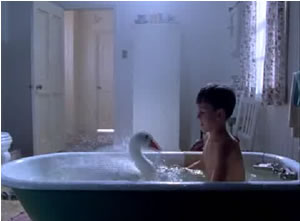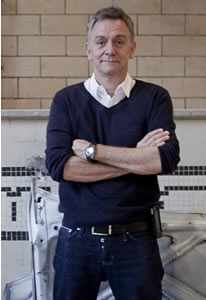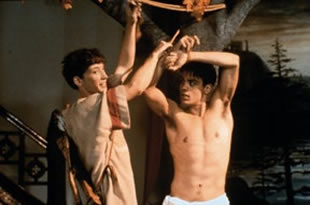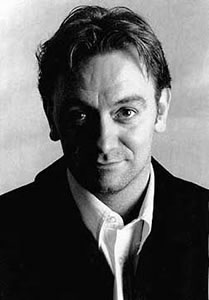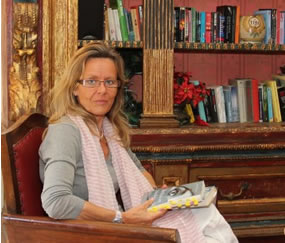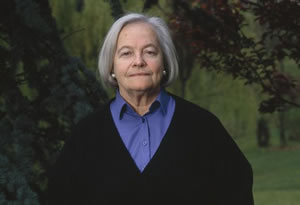De Amerikaanse dichter en uitgever William Rose Benét werd geboren op 2 febrari 1886 in Fort Hamilton, Brooklyn, New York. Zie ook alle tags voor William Rose Benét op dit blog.
The South Wind
I’m as full of wisdom as a tree of leaves,
But the South WInd flows, blows and grieves,
Quivers every leaf with bewildering desire
Till a pallor of blossom ripples forth like fire,
Till I’m as full of color as a spring cherry tree
With a miracle of moonlight spilled over me,
And on the branches gnarled and boughs they ought to prune
Memory s dancing fantastic to the moon!
Solid Earth
Scurvy doctrine, that the world is a bubble—
It is much more solid than that!
A monument built out of rubble,
If you will—a high silk hat
With the inevitable brick inside,
A perfect whale of a brick!
Love to make you vain, and pride
To make you sick.
Scurvy doctrine, that love’s a tambourine. A
Love that is fond and true
Is exactly like a tame hyena
(I’m telling this to you!) —
A perfectly tangible hyena,
With perfectly ponderable paws.
You could climb a mountain in Argentina,
But you’d know it was.
Scurvy doctrine, that joy is fleeting—
Joy is howling aloud
At everyone, in every meeting,
In every crowd!
Joy is what the heavens shake with
At the earth beneath.
Joy is the thing you tame the snake with—
And grit your teeth.
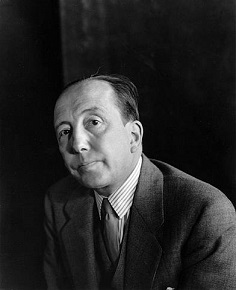
William Rose Benét (2 februari 1886 – 4 mei 1950)
De Canadese toneelschrijver Michel Marc Bouchard werd geboren op 2 februari 1958 in Saint Coeur-de-Marie, Quebec. Zie ook ook alle tags voor Michel Marc Bouchard op dit blog.
Uit: Christine, la reine-garçon
« Les murs sont ornés de têtes de grands cerfs et autres cervidés aux bois imposants.
ERIKA.– (au public) C’est arrivé soudainement. La reine était enjouée, comme elle sait trop rarement l’être. Ces jours-là, même l’écho de ses jurons apporte une félicité sur toute la cour. Je me rappelle aussi la lune. Elle était grosse. Elle rendait les ombres longues et généreuses. C’était une lune trompeuse. On ne voyait pas le sombre rideau s’avancer au loin. Le rideau gris noir, gris louche. Et les jurons heureux de la reine couvraient le silence de ce qui allait s’abattre. Il y avait le chancelier et son fils, l’ambassadeur de France et son philosophe. Il y avait aussi Karl Gustav, le cousin de la reine. Les traîneaux glissaient à toute vitesse sur les glaces du lac Mälar. Les rennes étaient difficiles à guider. Leur instinct les avait sûrement avisés de ce qui allait se passer. Et la neige, le vent, la furie. Le ciel s’est abattu sur nous.
Christine entre, suivie de Karl Gustav, du chancelier Axel et du comte Johan, son fils. Leurs manteaux dégoulinent de neige fondante. Erika veut débarrasser Christine de son manteau mais celle-ci la repousse en la faisant presque tomber. Erika se redresse aussitôt et salue. Chanut et Descartes se joignent au groupe.
KARL GUSTAV.– (genoux au sol et retenant mal ses pleurs) Je reconnais toute l’étendue de ma faute ! Je me résigne à en subir la punition.
CHRISTINE.–(calme) Tu m’as fait mal !
KARL GUSTAV.–Pardonne-moi !
CHRISTINE.–Tu m’as fait mal à l’épaule.
KARL GUSTAV.–Je pleure.
CHRISTINE.– Je ne t’ai pas autorisé à pleurer.
KARL GUSTAV.–J’implore ta miséricorde!
CHRISTINE.– Je ne t’ai pas autorisé à gémir.
KARL GUSTAV Conviens qu’une telle offense est de celles qui partent d’un trop grand attachement.”
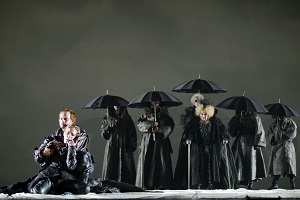
Michel Marc Bouchard (Saint Coeur-de-Marie, 2 februari 1958)
Scene uit een opvoering in Montréal, 2012
De Viëtnamese dichter Xuân Diệu werd geboren op 2 februari 1916 in Gò Bồi, gemeente Tùng Giản. Zie ookook alle tags voor Xuân Diệu op dit blog.
Haste
I want to turn off sunshine
So colors cannot fade.
I want to tie wind up
So scents cannot flee.
From butterflies and bees, here is the honeymoon
Here are flowers of verdant meadows
And leaves of flickering virgin branches
From swallows and orioles, here is the ballad
And here, when light flicks through our lashes,
Every morning, God of Joy knocks on the door,
January is as luscious as a nearby pair of lips
I’m in bliss, but also in haste
I don’t need summer heat to reminisce about spring
A coming spring means a passing spring
A blooming spring means an aging spring
Once spring is through, I am over.
My heart is large, but the blessing is limited.
Youthful days are never prolonged.
Pointless to say spring is recurring,
If my youth can never return.
The Earth is here, but I am not,
The longing lingers, and I grieve.
Days are redolent of partings
And the mountains echo farewells
The lovely wind whispers with leaves
Does she resent that she has to fly?
Buoyant birds just stop twittering,
Fearful of waning times ahead?
Never, oh never again.
Hurry up, colors have yet to pale.
I want to embrace
All the fresh, burgeoning lives
I want to haul wandering clouds and swerving wind
I want to indulge in the butterflies of love
I want to garner in an ample kiss:
My homeland, my trees, and budding grass
Dazed by fragrances, full with light
Sated with the prime of youth
Dear Blushed Spring, I want to bite you.
Vertaald door Quynh Nguyen
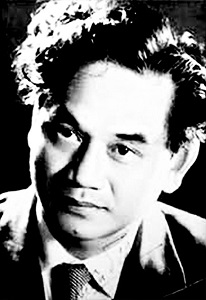
Xuân Diệu (2 februari 1916 – 18 december 1985)
De Duitse dichter Ludwig Eichrodt werd geboren op 2 februari 1827 in Durlach bij Karlsruhe. Zie ook alle tags voor Ludwig Eichrodt op dit blog.
Von der Freundschaft
Wer keinen Freund gefunden,
Und immer stand allein,
Der hat auch nie empfunden recht
Das Glück, ein Mensch zu sein.
Wer keinen Freund gefunden,
Der ist vielleicht ein – Christ;
Der ist vielleicht ein Schurke traun!
Wenn er kein Esel ist.
Vielleicht ein Unglücksvogel
Mag der Verkannte sein,
Doch der ist auch der Einzige,
Dem ich es kann verzeihn.
Sonntags
Die großen weißen Flocken
Fliegen so leis und matt,
Freudige Festtagsglocken
Läuten über die Stadt.
Da sitz ich am Tisch und schreibe,
Schreibe wie mir es glückt,
Dort an eisblumiger Scheibe
Hungrig ein Vöglein pickt.
In meiner Stub hierinnen
Ist es so warm und still,
Ich fange mich an zu besinnen
Was dir ich schreiben will.
In kalten Kirchenräumen
Betest du jetzt für mich,
Und Ich weiß nur zu träumen
Und thue Nichts für dich.
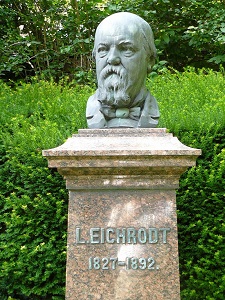
Ludwig Eichrodt (2 februari 1827 – 2 februari 1892)
Monument in Lahr
De Armeense dichter en schrijver Gostan Zarian werd geboren op 2 februari 1885 in Shemakha, voormalige hoofdstad van Azerbeidzjan. Zie ook alle tags voor Gostan Zarian op dit blog.
The Guest
Do not be upset when someone
Gently opens the door
And walks into
The room
And sits down
In front of your hard bread.
Quick, straighten the cover
And smile
Putting your whole heart
Into your eyes
And let that angel
Lift to its lips
The goblet
And imbibe with gusto
The wine of your days
To the bottom.
Do not be upset when gently
Someone opens the door
And comes in…
Vertaald door Tatul Sonentz
My Song
I want my song to be like the bread
on the laborer’s table, humble,
modest as the bride is modest,
she who, like the pomegranate tree in bloom
burns the countryside
with spring fever, burning all the while inside,
with her own silent love.
I want my song to tell
the burning, undeclared and silent pain.
Let it have the voice,
and modulations of the saz
to give wings to common words.
Like the profile of a mountain,
magnificent in simplicity;
like an autumn tree
flowing with gold,
like the heavy pace
of the forced traveler far from home,
like the faded glimmer of the broken mirror,
like the wheat field
in gentle wind;
like the everyday sorcery
of light refracted in crystal
let my song sing.
And let the simple hearts who see such things
understand its castanet beat,
the same beat as the pulse in my arm.
I want my song to be simple,
humble as a piece of bread.
Vertaald door Diana Der-Hovanessian
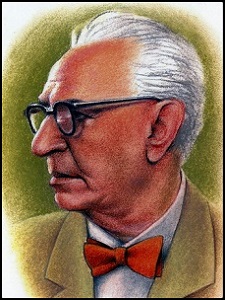
Gostan Zarian (2 februari 1885 – 11 december 1969)
De Duitse dichter en schrijver Johann Christoph Gottsched werd geboren in Juditten (bij Koningsbergen) op 2 februari 1700. Zie ook alle tags voor Johann Christoph Gottsched op dit blog.
An Jungfer L. A. V. Kulmus
Ein Jahr ist hin, o Schönste! daß mein Bild
Sich schon bey dir zum Opfer eingefunden;
Doch ist mein Wunsch nach deinem nicht erfüllt;
So sehr seit dem die Herzen sich verbunden.
Erfreue mich, dafern du lieben kannst,
Und laß dein Herz durch keinen Einwurf stören.
Ja, wo du mich nicht aus der Brust verbannst:
So laß dein Bild mich deine Neigung lehren.
Der edle Geist, der deine Stirn erhebt,
Der helle Blitz, aus deinen klugen Blicken,
Wird deinen Freund, der nur durch dich noch lebt,
In manchem Gram, an deiner statt, erquicken.
Victoria! mein Leben, Herz und Licht!
Fleh ich umsonst um deinen bloßen Schatten;
So schmäuchle mir mit deiner Liebe nicht:
Wie schwer wird sich das Wesen selber gatten?
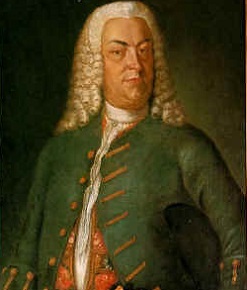
Johann Ch. Gottsched (2 februari 1700 – 12 december 1766)
Portret door Leonhard Schorer, 1744
De Amerikaanse schrijfster van Russische komaf Ayn Rand (eig. Alissa “Alice” Zinovievna Rosenbaum) werd geboren in Sint-Petersburg op 2 februari 1905. Zie ook alle tags voor Ayn Rand op dit blog.
Uit: Anthem
“It is a sin to write this. It is a sin to think words no others think and to put them down upon a paper no others are to see. It is base and evil. It is as if we were speaking alone to no ears but our own. And we know well that there is no transgression blacker than to do or think alone. We have broken the laws. The laws say that men may not write unless the Council of Vocations bid them so. May we be forgiven!
But this is not the only sin upon us. We have committed a greater crime, and for this crime there is no name. What punishment awaits us if it be discovered we know not, for no such crime has come in the memory of men and there are no laws to provide for it.
It is dark here. The flame of the candle stands still in the air. Nothing moves in this tunnel save our hand on the paper. We are alone here under the earth. It is a fearful word, alone. The laws say that none among men may be alone, ever and at any time, for this is the great transgression and the root of all evil. But we have broken many laws. And now there is nothing here save our one body, and it is strange to see only two legs stretched on the ground, and on the wall before us the shadow of our one head.
The walls are cracked and water runs upon them in thin threads without sound, black and glistening as blood. We stole the candle from the larder of the Home of the Street Sweepers. We shall be sentenced to ten years in the Palace of Corrective Detention if it be discovered. But this matters not. It
matters only that the light is precious and we should not waste it to write when we need it for that work which is our crime. Nothing matters save the work, our secret, our evil, our precious work. Still, we must also write, for²may the Council have mercy upon us!²we wish to speak for once to no ears but our own.
Our name is Equality 7-2521, as it is written on the iron bracelet which all our men wear on their left wrists with their nanes upon i We are twenty-one years old. We are six fret tat and this is a burden, for there are not maw men who are six feet tall. Ever haw the Teachers and the Leaders paled to us and frowned and saki: ‘Mere is evil your bones, Equally 7-2521, for your body bas grown beyond the bodies of your brothers.” But we camot change or bars mr ow body.”
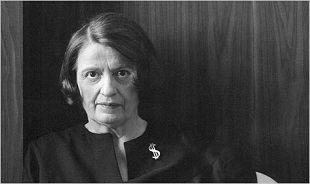
Ayn Rand (2 februari 1905 – 6 maart 1982)
De Duitse dichter en leraar Michael Öchsner werd geboren op 2 februari 1816 in München. Zie ook alle tags voor Michael Öchsner op dit blog.
Bayernhymne (Fransee vertaling)
Que Dieu soit avec toi, État de Bavière,
terre allemande, Patrie!
sur ton grand territoire,
se pose Sa main miséricordieuse!
|: Il protège vos prairies,
sert de bouclier aux constructions de tes villes
Et conserve les couleurs
de Son ciel, blanc et bleu!
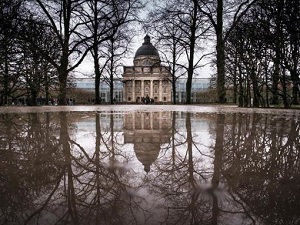
Michael Öchsner (2 februari 1816 – 8 oktober 1893)
Staatskanzlei en Hofgarten, München
Zie voor onderstaande schrijver ook mijn blog van 2 februari 20018.
De Zwitserse schrijfster Monica Camuglia werd geboren op 2 februari 1960 in St. Gallen. Zie ook ook alle tags voor Monica Camuglia op dit blog.

